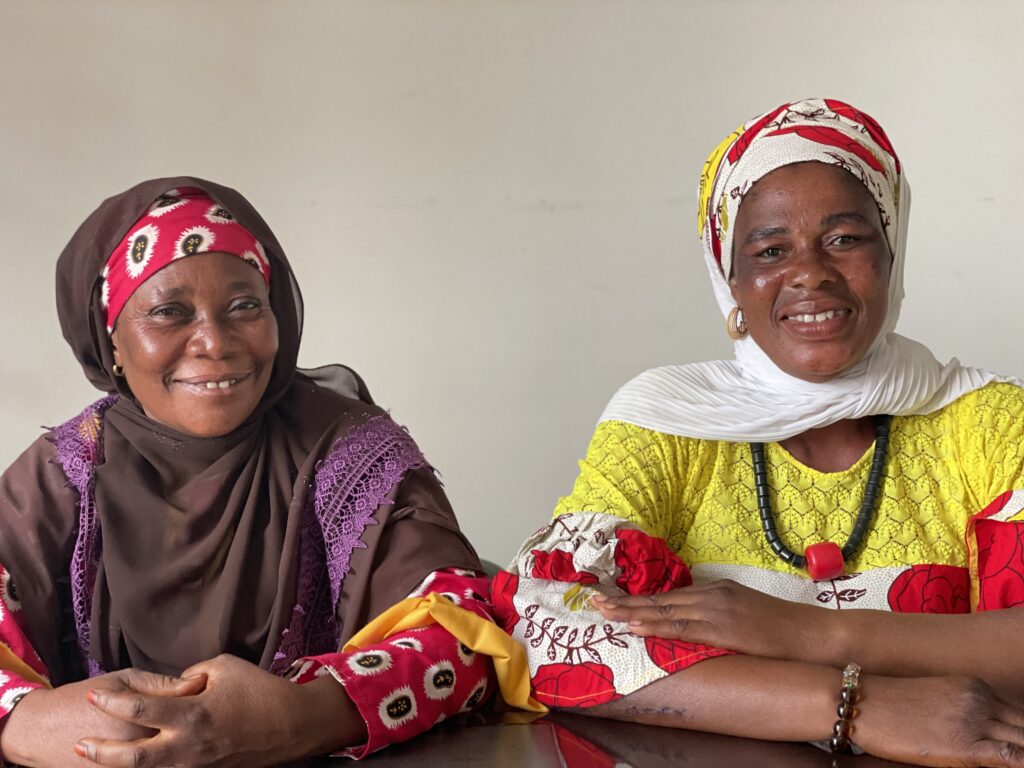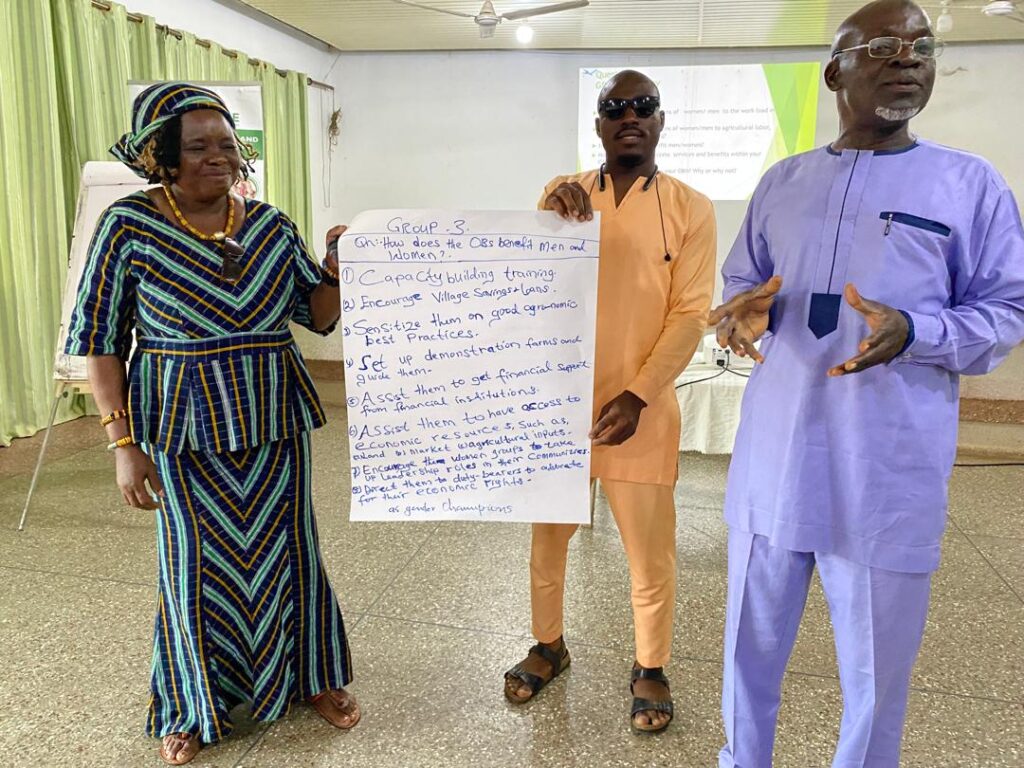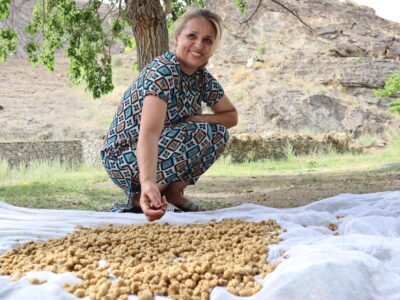
In Ghana, like many places in sub-Saharan Africa, women are underrepresented in the formal workforce and disadvantaged in agriculture. Women farmers have significantly less access to, control over, and ownership of land and other productive assets compared to their male counterparts. For example, less than 15 percent of agricultural landholders globally are women, although this varies widely across countries. According to the Food and Agriculture Organization (FAO 2018), closing the gender gap in farm productivity and the wage gap in agrifood-system employment could increase global gross domestic product by 1 percent –nearly USD 1 trillion.
Gender inequalities persist in northern Ghana. Cultural practices, specifically the patriarchal system, low participation in decision-making, unpaid care work, and lack of access to economic resources are cited as drivers. The situation of inequalities contributes to some of the issues related to food insecurity and undermines efforts to build resilience in rural communities.
As part of its work to enhance the capacity of the various market actors in northern Ghana to develop the market and build mechanisms to improve resilience, the Feed the Future Ghana Market Systems and Resilience (MSR) Activity specifically emphasizes empowering women, youth, and marginalized populations through its gender, youth, and social inclusion (GYSI) approach. One key action of GYSI has been its work with women, youths, and people with disabilities to raise gender champions who will spearhead gender equality. Training of gender champions is a pivotal aspect of this initiative, aimed at cultivating advocates who can effectively promote gender equality and social inclusion within the agricultural market systems and help address inequalities.
Training is a key component of the GYSI work to raise gender champions. With the support of a consultant from Urbanet Ghana, the Ghana MSR Activity conducted five gender equality champion (GEC) training sessions in the Northern, Northeast, Upper East, and Upper West regions to strengthen gender equality and women’s economic empowerment within outgrower business networks (OBNs) to identify and select the gender champions to promote inclusivity within the 10 OBNs.
The OBN leaders included men and women dedicated to advancing women’s access to productive resources and finance, as well as increasing women’s membership in the OBNs. The gender champion trainings included a series of participatory activities focused on three objectives:
- Help the gender champions understand how the connection between gender and social norms shapes men’s and women’s roles in the household, community, and agricultural activities.
- Understand the impact of gender-based disparities on OBNs’ operations and consider actions that gender champions can take in their day-to-day operations to address disparities.
- Support OBN leaders as gender champions to develop concrete action plans that the wider network can apply to advance gender equality and establish mechanisms that OBNs can use to assess if they are achieving their goals.

Following the GYSI support, several women felt emboldened to work in male-dominated areas of agriculture. One such woman is Yahaya Rukaya, a commercial farmer who cultivates soybean and maize, a traditionally male crop.
As a member of the Sissala Area OBN based in Tumu, she participated in Ghana MSR’s gender champion training.
“The perception that women just do housekeeping or cooking is outdated. We understand now that we can do better. We can engage in commercial farming, and some are already doing it. We encourage other women to join us. We train them to understand that a woman’s place is not just in the kitchen. We can do more. You start gradually, and then you grow. You can become an entrepreneur,” said Rukaya after the training.
With support and encouragement from Ghana MSR, several women like Rukaya are helping other women without capital by aggregating smallholder harvests to cover mechanization and input costs, so they can start farming.
Ghana MSR’s work on gender started to change the mindset of men and encourage their full support and participation in the journey toward empowering women. Many men, including Adamu Yakubu, a commercial farmer, and a member of the Sissala Area OBN have advocated for increasing women’s membership in the network.
“This will allow women to access opportunities like networking with large aggregators, earning higher commissions to cover household costs. Addressing gender inequalities will create a level playing field for women to reach higher levels and leadership roles.”
Adamu Yakubu, commercial farmer
Other male participants of the workshop, including Mahmoud Muhsin Afandi, an input dealer and member of the Jirapa OBN, echoed the same sentiments.

Through various interventions, Ghana MSR has supported the OBNs in implementing policies to increase women’s membership, aiming to add more women to their networks. The Sissala OBN added 50 women to its network. As a way of improving records on Ghana MSR’s work in addressing inequalities, OBNs have been supported to take actions including:
- Keeping records of services provided to both men and women
- Considering women’s gender roles when arranging meetings
- Encouraging women’s leadership on the OBN executive committees and in community groups
- Raising awareness about gender roles and responsibilities in their communities through capacity-building training, radio programs with municipal gender affairs officers, and workshops for all genders on new farming technologies
- Registering more women for farming services and conducting gender sensitization step-down training on the responsibilities to be shared between couples
This Ghana MSR activity is helping to change mindsets and increasing the understanding of the need to address inequalities.
“I have seen how open dialogue transforms perspectives and empowers individuals, fosters empathy, turns skeptics into advocates, and amplifies quiet voices. It is a continuous journey of learning and unlearning,” says the Activity’s GYSI director, Zinabu Abdulai.
The changes in the behavior and attitudes towards empowering women and reducing inequalities are going a long way to set the stage for a wider and all-inclusive approach to addressing gender-based inequalities in Northern Ghana.
Learn more about the Feed the Future Ghana Market Systems and Resilience Activity.
Learn more about our work in Ghana.








